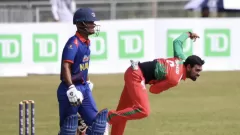Anil Kumble Criticizes BCCI’s Decision That Could Impact Team India's Border-Gavaskar Trophy Performance 2024-25
India’s recent 3-0 series defeat to New Zealand at home has sparked concerns about the team’s preparedness, with former cricket legend Anil Kumble voicing strong criticism of the Board of Control for Cricket in India (BCCI). The team’s lack of practice games before the upcoming Border-Gavaskar Trophy against Australia, starting on November 22 in Perth, has been a focal point of discussion. Kumble, alongside many fans and analysts, believes that this decision may have long-lasting implications, especially as India needs a resounding victory to stay competitive in the World Test Championship (WTC).
India’s Struggling Form and the Crucial Need for Preparations
With their undefeated home streak snapped by New Zealand, India’s recent losses indicate vulnerabilities that need immediate attention. The team will face Australia on bouncy, fast pitches that are drastically different from Indian conditions. Given the high-stakes nature of the Border-Gavaskar Trophy and its implications on WTC standings, the lack of on-ground preparation has left many questioning BCCI's decision to cancel practice games. Kumble noted that a warm-up match could have given players, especially those new to Australia’s pitches, a critical chance to adapt and refine their skills.
In an interview on JioCinema, Kumble shared, “I'm a bit surprised that India doesn't have a practice match before the first Test, as it would have been ideal preparation.” His point highlights the limitations of net sessions in replicating real-match pressures, a concern echoed by others who understand the demands of Australian pitches.
Rohit Sharma Defends Team’s Preparation Strategy
Despite mounting criticism, Indian captain Rohit Sharma defended the team’s preparation plans. According to Sharma, the squad will focus on match simulations at the WACA ground in Perth. Unlike a full match, these simulations allow for tailored sessions where batters can retire after playing specific ball quotas, giving others time to practice without the rigidity of a traditional game structure.
Sharma emphasized that this flexible approach allows for a high-intensity practice that might not be possible in a short window. "We are traveling with a squad of 19 players, and only three days were allotted to us. I don’t know how much workload we can get in those three days," Sharma stated, underlining his preference for a highly controlled environment over a single practice match.
Kumble’s Concerns: Why Practice Matches Are Essential for Overseas Series
Anil Kumble’s concerns stem from his understanding of the unique challenges of playing overseas, especially in Australia. The conditions there are drastically different from those in India, with pitches that favor pace and bounce. Kumble explained that these conditions, combined with Australia’s skilled bowling lineup, are challenging to replicate outside of actual match play.
Historically, practice matches have been crucial for acclimating players to foreign conditions. For example, during previous Australia tours, these matches helped Indian players adjust to the fast, high-bounce pitches. Kumble argued that skipping these matches leaves players at risk of facing unpredictable situations without adequate preparation, possibly costing the team in the initial stages of the series.
India’s Home Defeat to New Zealand: A Warning Signal
The recent home series defeat against New Zealand has already exposed several chinks in India’s armor. India’s batting lineup faced immense challenges, crumbling under pressure, which has amplified the need for targeted preparation. Without a practice match, replicating real-game pressures in a foreign environment is a tall order, and India’s squad may struggle to counter Australia’s aggressive strategies from the outset. This recent loss has shaken the confidence of fans and analysts alike, prompting discussions about the team’s ability to adapt and recover quickly.
Key Players Join India A Squad in Australia: A Step in the Right Direction?
To bridge the preparation gap, KL Rahul and Dhruv Jurel have joined the India A squad in Australia, where they’ll play a four-day match against Australia A at the Melbourne Cricket Ground. This match aims to give them valuable match-time in Australian conditions, a significant advantage for both players. Rahul’s recent performances have been sporadic, and Jurel, who is yet to make his Test debut, stands to gain crucial experience.
While Kumble supports this move, he feels that the entire Indian squad would benefit from a similar experience. A single simulation session, as planned by the team, lacks the intensity and unpredictability of a live match against top-tier bowlers, which could better prepare the team for real challenges.
What Could Be the Impact of Skipping the Practice Match?
The decision to skip the practice match has potential long-term impacts:
- Unfamiliarity with Conditions: Without live match exposure, players may struggle to adapt quickly to the challenging Australian pitches.
- Vulnerability Against Australia’s Bowling: Australia’s aggressive bowling lineup, skilled in exploiting home conditions, may unsettle the Indian batters unfamiliar with the bounce and pace.
- Reduced Team Cohesion: Practice matches often allow players to develop an on-ground rhythm, which can be critical in maintaining composure under pressure.
A Test of Adaptability: Will India’s Strategy Prove Effective?
India’s preparation strategy will likely face its first major test in the initial days of the series. The coaching staff and management will need to make adjustments based on real-time performance in Australia, but the absence of live match practice may expose weaknesses early on. The strategy hinges on the assumption that simulations will be sufficient to prepare players for Australia’s unique conditions, but many believe this may not replace the rigor of live competition.
Kumble's Suggested Approach: What Could Have Been Done Differently?
Reflecting on his experiences, Kumble suggested that BCCI could have scheduled a practice game between the Indian squad and an India A team, ideally in Perth. This would allow India’s primary squad to face bowlers accustomed to Australian conditions, giving them realistic exposure to what they’ll face against Australia. Additionally, this would allow newer players to get acclimated under real-game conditions, bridging the experience gap that often affects performance.
Looking Ahead: Will India Rise to the Challenge?
The Border-Gavaskar Trophy is always a highly anticipated series, and with India needing a 4-0 win to stay competitive in the World Test Championship, the stakes couldn’t be higher. India’s approach to preparation will be tested against one of the most formidable teams in world cricket. Although the BCCI’s decision remains controversial, fans and experts alike are hopeful that the team can rise to the challenge despite limited on-ground preparation.
India’s performance in this series could shape the future of BCCI’s approach to overseas preparations, especially if the lack of practice matches turns out to be a disadvantage. As Indian cricket fans await the first ball of the series, the question remains: will India’s alternative preparation strategy be enough?


TOPICS MENTIONED IN THIS ARTICLE
Disclaimer
Possible11 is a sports news and analysis platform designed purely for entertainment and educational purposes. All match previews, player insights, and team analyses are based on publicly available information and expert opinions. We do not promote or support betting, gambling, or real-money gaming in any form. Users are encouraged to enjoy our content responsibly and use it for informational purposes only.





















Give Your Feedback